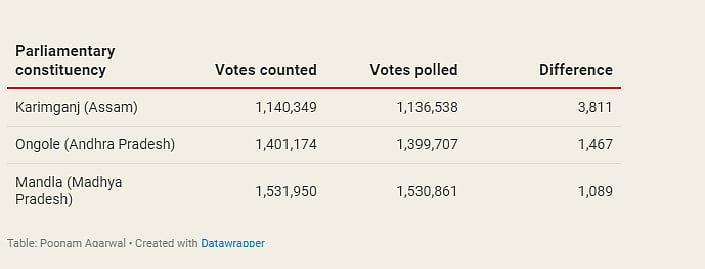EVM vote count exceeds polled votes in over 140 LS seats, says report
There are also instances where the number of EVM votes counted is fewer than the number of votes polled

In a startling revelation, data from the Election Commission of India (ECI) for the 2024 Lok Sabha elections has unveiled significant discrepancies in almost all parliamentary constituencies (PCs).
An in-depth analysis of ECI data across 543 PCs indicates that except for a few, such as Daman & Diu, Lakshadweep, and Attingal in Kerala, there is a mismatch between the number of EVM votes counted and those polled.
In more than 140 PCs, the number of EVM votes counted exceeded the number of EVM votes polled. The disparities range from a minor difference of two votes to a substantial gap of 3,811 votes, claimed independent journalist Poonam Agarwal.
Conversely, there are also instances where the number of EVM votes counted is fewer than the number of votes claimed to have been polled, claimed Agarwal in an article published in The Wire.
These findings raise serious concerns about the accuracy and reliability of the voting process in the 2024 Lok Sabha elections, calling for a thorough investigation to ensure the integrity of the electoral process.
According to Agarwal, these are the top three PCs where a surplus of EVM votes were counted.

And here are the top three PCs where there was a deficit in the EVM votes counted.

Agarwal also released videos on her YouTube channel in which she claimed that in some constituencies, the differences between votes polled and counted were as low as two votes, leading to extremely slim winning margins. Consider these PCs where the victory margin was lowered by alleged discrepancies.
Mumbai North West (Maharashtra): 951,580 EVM votes were polled, but 951,582 were counted, i.e. two surplus votes were counted. The Shiv Sena’s Ravindra Dattaram Waikar secured the lowest victory margin here by a mere 48 votes, defeating Shiv Sena (UBT) candidate Amol Gajanan.
Jaipur Rural (Rajasthan): 1,238,818 EVM votes were polled but 1,237,966 EVM votes were counted, i.e. 852 votes weren’t counted. The BJP’s Rao Rajendra Singh won the seat by a slim margin of 1,615 votes.
Kanker (Chhattisgarh): 1,261,103 EVM votes were polled but 1,260,153 EVM votes were counted, i.e. 950 votes weren’t counted. The BJP’s Bhojraj Nag won the seat by a margin of 1,884 votes.
Farrukhabad (Uttar Pradesh): 1,032,244 EVM votes were polled but 1,031,784 EVM votes were counted, i.e. 460 votes weren’t counted. The BJP’s Mukesh Rajput won the seat by a margin of 2,678 votes.
It is noteworthy that the ECI only released the absolute number of EVM votes polled in the 2024 elections following significant pushback from political parties and civil society members.
Initially, for the first five phases of the election, the ECI had only provided the percentages of votes polled in each constituency relative to the total number of electors. On 25 May, the EC published the actual number of EVM votes polled in these phases, asserting that "any alteration in the number of votes polled is not possible."
These findings raise serious concerns about the accuracy and reliability of the voting process in the 2024 Lok Sabha elections, calling for a thorough investigation to ensure the integrity of the electoral process.
Follow us on: Facebook, Twitter, Google News, Instagram
Join our official telegram channel (@nationalherald) and stay updated with the latest headlines